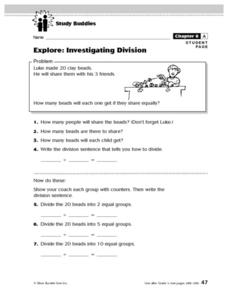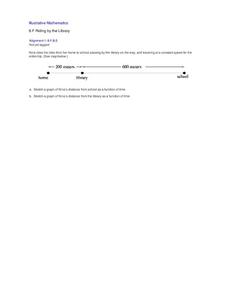Curated OER
Inductive and Deductive Reasoning
Students use logical arguments and inductive reasoning to make or disprove conjectures. After observing a teacher led demonstration, students discover that the deductive process narrows facts to a few possible conclusions. In groups,...
Curated OER
Putting It All Together: The Personal Plan of Study (Part 3)
Eighth graders discuss the culminating activity to a unit in which they determine how they will present their "Design for My Future" and "My Personal Plan of Study." They pull together all of their work from the unit before writing a...
Curated OER
Relating Multiplication and Division Facts
Math wizards investigate multiplication and division fact families. They solve five problems in which they find fact families and draw arrays.
Curated OER
Explore: Investigating Division
In this exploring and investigating division worksheet, students, working with a partner, study and answer seven clues to exploring and investigating division equations.
Curated OER
Student Exploration: Fraction, Decimal, Percent
Students explore the concept of fractions, decimals, and percents. In this number sense lesson plan, students use a worksheet to guide them through the exploration of the relationship between fractions, decimals, and percents. Students...
Curated OER
Tuberculosis Project
Reasearch the transmission of tuberculosis and design a communication product to help youth understand the risks of the disease, how it is tested for, and the benefits of proper treatment. This project incorporates language arts, math,...
Curated OER
Social Studies: Area and Population Density
Math scholars of many ages examine the concept of population density and then discuss the significance of the population densities of Minnesota and China. They figure the population density of their school.
Curated OER
Shapes Around Us
Students identify basic two-dimensional shapes. They are able to identify the four basic two-dimensional shapes: squares, rectangles, triangles, and circles. Students write/draw in their learning logs a reflection of what they noticed...
Curated OER
Projectiles
Pupils measure the angle and distance of an arc. In this projectile lesson, students observe arcs created by water guns, bow and arrows, and slingshots, then work in small groups and use protractors and strings to measure the angle and...
Curated OER
Butterfly Addition: Color by Numbers
Children learning to add numbers up to 11 develop the strategy of using the larger number as the first addend and counting on from there to find a sum. They define addition and review the meaning of the plus (+) symbol. To practice, they...
Curated OER
Fractions And Integers Review
Investigate the concepts of fractions and integers in order to review for a future assessment. The teacher reviews the major concepts with the class and provides help throughout the lesson as needed. Math middle schoolers work together...
Curated OER
Power Problem
Students complete an electricity activity to learn about power outages, insurance, and weather preparation. Students use the worksheet 'Power Problem Work Sheet' and use the 'Global Grocery List Project price list for the U.S.' to...
Curated OER
And You Thought Gasoline Was Expensive!
Students carry out a cost analysis. In this comparative math lesson, students compare the cost of equal measures of gasoline to mouthwash, house paint, fruit juice, white-out, and other liquids.
Odyssey of the Mind
Odyssey of the Mind Curriculum Activity: Shape-Shifter
Geometry is everywhere, and I mean everywhere! Those skillful mathematicians discuss shapes and then come up with a well-researched list of shapes seen in everyday applications. They put their knowledge of shapes to work as each small...
Illustrative Mathematics
Riding by the Library
Draw a graph that shows the qualitative features of a function that has been described verbally. Make sure learners understand where time is zero and the distance is zero. It may take them some time to understand this concept, so working...
National Gallery of Canada
Counting Circles
Learners look at bands of colors and estimate how many rings of color there are. While working in groups, they come up with a plan of how to accurately count the rings. They attempt to find a pattern in the colors, and decide whether...
Curated OER
Tetrahedron Kites
Let's go fly a kite! Discuss the concept of two-dimensional and three-dimensional objects with your math class. They examine a triangle and discuss the face, vertices, edges, and angles. Then they build their own Tetrahedral Kites and...
Curated OER
How Simple Is Your Rational Expression?
Investigate simplifying rational expressions. Learners define rational expressions, review how numerators and denominators are polynomials and complete several problems using a checklist to ensure they don't skip any steps. Work can be...
Curated OER
Soil Scrolls
Third graders examine soil samples and explore the what happens in each layer of the subsoil. They work in cooperative groups to create a scroll that shows what takes place in each layer, and discuss why much of the activity is in the...
Curated OER
Line Symmetry and Rotational Symmetry
Fifth graders investigate the symmetry of pattern block shapes. Students, working in groups determine whether each shape has line symmetry, rotational symmetry or both kinds of symmetry. Students determine how many lines of symmetry the...
Curated OER
Introduce Double-Digit Addition
Students generate a list of numbers then classify them into groups of single digit and double-digit numbers. After listening to a children's book about double-digit addition, they work with tens and ones blocks to solve double-digit...
Curated OER
Investigation - What's the Number?: Division
Seventh graders explore number sentences using a variety of strategies making each equation a true sentence. Students examine strategies such as patterns, trial and error, working backwards, and related problems. In groups, 7th graders...
Curated OER
Names for Numbers
In this mathematics worksheet, 1st graders identify various numbers and use counters to illustrate each fact given. Then they complete the math sentences correctly.
Alabama Learning Exchange
Fun with Problem Solving
Using a varity of strategies, young mathematicians solve multistep word problems. They play a logic game as a whole group, and then work with a partner on a computer to complete a worksheet that requires a variety of problem solving...

























